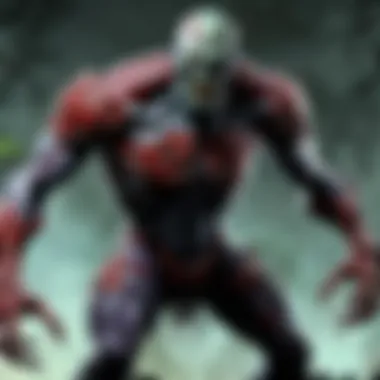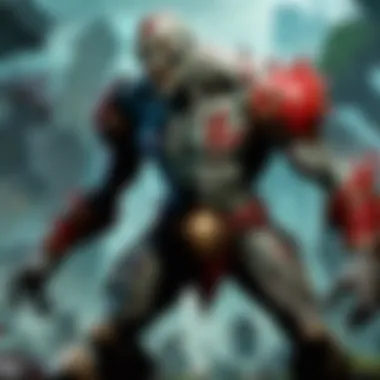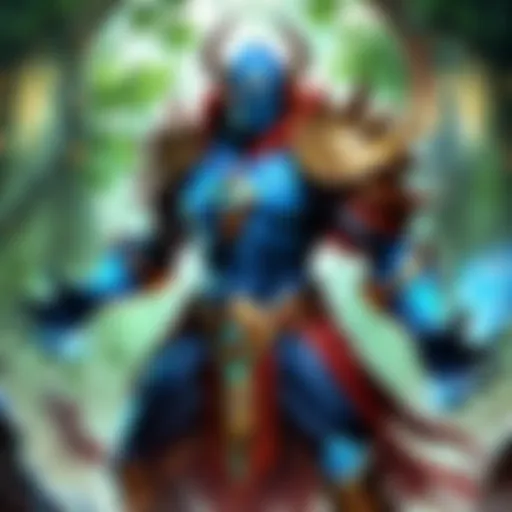Exploring Zombie Precon: Impact on Dota Gameplay Dynamics


Intro
In the realm of Dota 2, the term 'zombie precon' emerges as a concept of significance. This phenomenom intertwines player behavior, hero dynamics, and competitive strategies, influencing how games are approached and executed.
Zombie precon essentially points to the mindset players adopt while engaging with specific heroes. This mindset might originate from various user experiences and can lead to distinctive behavioral patterns during gameplay. To grasp its depth, an analytical view is necessary, observing both the micro-level mechanics at play and the macro-level effects on the entire gameplay experience.
By dissecting the implications of zombie precon, players, whether novice or experienced, can gain insight into why certain strategies and approaches become enshrined within the meta. Understanding these nuances not only augments gameplay but also delivers a broader comprehension of the dynamics within competitive Dota 2.
Hero Guides
Basics of the hero
To navigate the landscape of zombie precon, one must first understand the art of hero selection. Heroes aren't just selections in a pool; they embody unique playstyles, abilities, and potential contributions to a team. Players often gravitate towards certain heroes based on prior experiences or collective evolution of strategies, which emphasizes the underlying current of zombie precon.
Skill build and leveling guide
A critical aspect do determnine the influence of zombie precon lies in the skill build for a particular hero. For example, some heroes showcase greater effectiveness when prioritizing certain abilities over others in early game stages. Recognizing the best order for leveling up these skills is key.
Emphasizing a standardized skill path can ignore individual decision-making, leading to more predictable play. Thus, a flexible skill build can significantly shift dynamics in gameplay.
Itemization and recommended items
The choice of items further showcases how zombie precon can manifest in teams and players. Deviating from traditional item paths can unsettle opponents, introducing unpredictability to strategies. Coaches and experienced players leads seek to build itemization paths that exploit opponent expectations based on established norms. Understanding the items that synchronize with hero roles actively dissects the depth of flow established by zombie precon.
Strategies and tips for playing the hero
When employing a hero, strategic tips emerge that reveal how to counter the assumptions brought along by zombie precon. Using imaginative uses of hero abilities along with spatial awareness can yield successful plays unbounded by a fixed mindset. Attempting daring engagements or repositioning tactics plays significant roles here.
Fostering a culture where lesser-known strategies and adaptations dovetail synergistically contributes to the demystifying and unfolding tension associated with zombie precon.
Prolusion to Zombie Precon
Definition and Overview
The term "zombie precon" refers to a specific phenomenon observed within Dota gameplay, where players tend to favor certain strategies that limit their adaptability. These strategies often derive from emotions or outdated perceptions about gameplay. In essence, players become like 'zombies' to a flawed approach that does not apply well to the current state of the game.
Understanding zombie precon is critical for both new and seasoned players. It helps elucidate why certain strategies prosper in casual play yet falter in a competitive environment. Recognizing these behavioral blockages enables players to refine their game. It not only enhances individual performance but also contributes to overall game strategy within a team context. Every time a player falls into such a pattern, they undermine opportunities for development.
Historical Context in Gaming
To grasp the nature of zombie precon, it’s vital to look at its backdrop in gaming history.
Historically, games often featured strategies believed to be effective in their respective eras but eventually became obsolete. These may include tactics personally championed by engaged players or those glimpsed through community discourse.
In many multiplayer online battle arena games, including Dota, player behavior often drifts toward commonly perceived, yet failing strategies. Thus, it creates a powerful cycle where players hesitate to modify their inkrit el strategy. An analysis of prior competitive seasons illustrates players holding onto old ideas longer than viable.
Hence, the evolution of gaming might see players managing cognitive inconsistency, giving rise to the zombie precon concept. Addressing this particular context greatly impacts how players approach competitions and progression. As said by a well-known figure in the community, "Sticking to the norms can hinder growth," accurately demonstrating the sentiment of evolving within an inherently dynamic environment.
Mechanics of Zombie Precon


Understanding the mechanics of Zombie Precon is crucial for grasping how it integrates into Dota's broader gameplay dynamics. This phenomenon alters behavior, informs strategy, and affects decision-making, particularly in high-stakes competitive settings. Players who recognize these mechanics can navigate challenges and take advantage of their opponents’ psychological weaknesses. In this section, we will unpack both core mechanics and the broader implications on gameplay.
Core Mechanics Explained
The concept of Zombie Precon in Dota is rooted in certain underlying mechanics that impact player interaction and strategy. At its core, the mechanics drive player decisions, often leading to flawed assumptions about risks and rewards.
One such mechanic is the fear of missing out (FOMO). Players start to believe that a negative result from their actions will set detrimental precedents, which often leads to over-cautious behavior. For example, a player who opts for a safe route—not engaging in confrontation—may inadvertently inhibit their team’s momentum.
Another critical mechanism is the herd mentality, in which players mimic behaviors of others under pressure. This can lead to a detrimental chain reaction, as players become rigid in their thought processes and movement. When a team becomes overly defensive, adopting a passive playstyle, it exacerbates the effects of Zombie Precon rapidly.
These core mechanics continuously shape the landscape of gameplay in Dota, transforming seemingly straightforward battles into intricate psychological interactions.
How Zombie Precon Affects Gameplay
The influence of Zombie Precon extends well beyond elementary understanding. It can drastically change specific gameplay elements and strategies during matches.
- Decision-Making: Players often feel paralyzed by analysis, becoming magnetically attracted to their past strategies, even if those leads provide no current benefit. This limited flexibility reduces the likelihood of innovative tactical plays, ultimately hampering the team's effectiveness.
- Team Dynamics: The zombie mentality can create discord within a team. If players are stuck in an unyielding structure, open communication breeds hesitancy. Teams rely heavily on each member's initiative, which gets undermined when players expect others to dictate gameplay.
- Game Pace: Zombie Precon can unexpectedly slow down the match pace. As players become more attentive to preservation of resources and self-protection, they hesitate to initiate skirmishes. Prolonged durations without aggressive plays can diminish tension and decrease the apparent stakes within the game.
- Contextual Adaptation: It is imperative to realize when the Zombie Precon may apply or carry unnecessary weight. Recognizing and breaking this emotional or strategic cycle is what the top players can achieve. Those who instead cultivate adaptability thrive in dynamic environments instead of focusing narrowly on fears.
Zombie Precon creates a self-perpetuating cycle within matches, ultimately draining the team’s potential and leaving behind a standard approach to combat.
By understanding how the mechanics of Zombie Precon affect gameplay, players can make necessary adjustments to their strategy and posture, enhancing their skill set and decision-making processes. Evaluating such interactions crucially enriches player insights and fosters potential growth in the esports scene.
Psychological Impact on Players
Understanding the psychological impact of zombie precon is crucial for both players and game developers. This aspect not only shapes individual performance but also ultimately influences the entire gaming environment. Players exhibit varied reactions to this phenomenon, affecting their strategies, teamwork, and mental approach to the game. Recognizing these impacts can help in creating better gameplay dynamics and improve experiences for participants.
Understanding Player Behavior
Player behavior in Dota often reflects individual psychology. Zombie precon can lead to certain predictable patterns. Some players may experience anxiety due to the fear of repeated mistakes. This anxiety might inhibit their decision-making, forcing them to stick to prior ineffective strategies instead of adapting to new situations. Consequently, understanding their tendencies can help in refining personal gameplay strategies.
Factors Influencing Player Behavior
- Experience level: Newer players may succumb to zombie precon more frequently; seasoned athletes tend to recognize and counteract it sooner.
- In-game observations: Players observing patterns in enemy behavior may conform to expectations, losing sight of their role in the match.
- Communication: Lack of communication within a team can exacerbate existing habits and adherence to preconceptions, leading to further emotional stress during gameplay.
By addressing these aspects, players can adjust their behavioral responses strategically.
Cognitive Dissonance in Gameplay
In Dota, cognitive dissonance arises when players internally conflict with their performance vs. their expectations. Specifically relating to zombie precon, this phenomenon can often emerge. This internal struggle can adversely affect decision-making, leading to frustration and erratic gameplay.
Key Elements of Cognitive Dissonance
- Disruption to Match Flow: When players fail to reconcile their strategies with observed match dynamics, gameplay can suffer.
- Emotional Fatigue: Continuous dissonance can lead to mental exhaustion, pushing players towards irrational decisions.
- Altered Team Dynamics: As individual discomfort rises, the lack of harmony may infect team behavior, resulting in poorly executed strategies, a thing unwanted in high-level matches.
Strategies for Overcoming Zombie Precon
In the realm of Dota, confronting zombie precon presents unique challenges to players. It hampers strategic effectiveness and stunts gameplay progression. Implementing specific strategies can help players adapt their approach, thus enhancing overall gameplay and securing better outcomes. It's essential not to disregard these strategies because they directly affect individual performance and team efficiency.
Adapting Playstyles


To adapt playstyles is critical in effectively overcoming zombie precon. Players often fall into habitual gaming patterns due to preconceived notions about hero abilities or item priorities. Identifying these patterns is the first step.
Here are key ways players can adapt and break out of zombie precon:
- Assessing the Game State: Regularly evaluate your resources, team composition, and the enemy's strengths. Adapt your chosen strategy according to this assessment.
- Hero Mastery: Invest time into understanding varied heroes. Even if a hero is not favored, knowing their abilities can broaden one's perspective.
- Customizing Loadouts: Alter item builds depending on gameplay scenarios. Respond to the specific threats and needs posed by your opponents rather than adhering to one-size-fits-all strategies.
Making these adjustments crucially changes how players perceive their potential, creating a versatile game style that is less prone to stagnant thinking.
Collaboration Techniques
Collaboration is an integral aspect of Dota that is often undervalued when addressing zombie precon. Effective team communication and engagement within gameplay can mitigate many of the pitfalls associated with repetitive strategies.
Collaboration techniques can include:
- Real-time Discussions: Use voice or text communications to share observations about opponents. These insights can be valuable in reshaping team strategy.
- Role Flexibility: Encourage team members to adjust their roles based on moment-to-moment conditions. A support player may temporarily take on a more aggressive role if the game situation demands it.
- Scheduled Briefings: Before each match, discuss strategies with teammates. Developing a cohesive game plan with input from all players can lead to less reliance on old habits.
Impact on Competitive Dota Scene
The concept of zombie precon plays a crucial role in the competitive Dota landscape. As the phenomenon influences both individual player performance and overall team dynamics, its implications can directly affect matches and tournaments. Understanding zombie precon allows players and strategists to anticipate and react to developing trends. This section will delve into the specific factors at play and the considerations important to understanding zombie precon in the competitive setting.
Trends Among Professional Players
Professional players often lead the charge in adopting new strategies, including those centered around zombie precon. Many top players have noted the impact this phenomenon has on their decision-making process in high pressure situations. Teams often share insights and observations about how gameplay habits shift when confronted with a loss, reinforcing zombie precon. This iterative process contributes to an evolving game meta.
'Adaptability is essential. When you see popular streamers or professionals utilizing zombie precon, it’s a signal to rethink typical strategies.'
Key trends include:
- Changing hero selections: Pro players are adjusting their hero choices to counteract the psychological effects of zombie precon. This more expansive understanding has allowed teams to break free from established 'meta' picks in instances.
- In-game decision making: The self-perpetuating cycle of zombie precon can lead to preemptive actions that deviate from players’ usual plans. Recognizing when to attack, retreat, or execute essential abilities becomes crucial in those moments where fear or hesitation arises from previous experiences.
- Training methodologies: Teams are beginning to prioritize mental resilience in practice, allowing players to confront their inherent misconceptions about gameplay that cause zombie precon to take root.
Meta Shifts and Zombie Precon
The meta within Dota evolves continuously, often swayed by novel strategies and their subsequent impacts. The presence of zombie precon has conspicuously raised attention among analysts. Players who exhibit zombie precon tendencies typically read situations through a historically biased lens. As professional players learn to confront these biases, the meta undergoes shifts that have long-lasting consequences.
Significant changes often observed include:
- Hero viability: Certain heroes, previously understood to dominate matches, might see their effectiveness waane, as their typical strengths don’t hold as harsh of a foothold owing to players adapting.
- Map strategies: Spatial awareness of the objective becomes even more pertinent in games filled with player-driven anxieties conditioned by zombie precon. Competitors revise their map control and effectiveness in vision management based on perceptions of vulnerability and aggression.
- Performance analytics: As players dive into data analysis, implications of zombie precon drive reform in drafting and playstyle, redistributing both focus and research aesthetics.
In summary, the competitive Dota scene is undeniably impacted by the presence of zombie precon. The mental impacts materialize not only in emotional aspects but also through decisions that lead to observable performance metrics. This comprehensive insight into trends among professionals and the evolving meta contributes to a broader understanding, invaluable for all players aiming at elevating their gameplay.
Community Reactions and Discussions
In the intricate world of Dota, community reactions and discussions play a significant role in shaping perceptions surrounding zombie precon. Understanding these dynamics not only enriches the player experience but also highlights the collective intelligence of gamers navigating these new terrains. Engaging in conversations within forums and on social media platforms allows insights to bubble to the surface. Gamers share experiences, strategies, and critique which enhances the overall competency of the community.
Forums and Social Media Insights
The communities within platforms such as Reddit and dedicated gaming forums enable players to dissect the zombie precon effect on gameplay in real-time. Here, individuals articulate their frustrations, strategies, and triumphs resulting when faced with this phenomenon. Popular forums act as dynamic repositories of knowledge, where nuanced discussions flourish. Some key aspects can emerge from these conversations:


- Shared Learning: Conversations typically reveal strategies to counter or effectively integrate zombie precon into various playstyles.
- Evolution of Playstyles: Players adapt considerably by responding to meta shifts influencing Dota gameplay.
- Diverse Opinions: Discussions offer myriad perspectives, informing newcomers about the complexities involved in dealing with zombie precon.
- FAQs Employment: Queries on how to navigate phantom opponents often highlight crucial nuances that experienced members take for granted.
Engaging with these forums unveils sentiment analysis trends, reflecting general attitudes across various player conducts. Grasping these sentiments provides clarity to new players seeking mentorship amid competitive frenzy.
Notable Opinions from Influencers
Influencer opinions are a notable facet of the narrative surrounding zombie precon in Dota. Prominent streamers, coaches, and analysts often function as valuable interpreters who read between the lines of direct gameplay.
The remarks from figures like Puppey, or streamers such as Forsen, are incredibly influential. Their insights shed light on specific player mindsets when facing zombie precon. Some noteworthy observations noted include:
- Impact on Decision Making: Influencers often highlight how zombie precon leads to hesitation in crucial moments. This loss of decisiveness can disrupt gameplay strategies.
- Balanced Discussions: By offering looping debates on how to mitigate the downsides of zombie precon, these personalities formulate constructive dialogue. The intention is informative rather than accusatorial to foster community growth.
- Ritual Learning: Influencers symbolize learning moments encapsulated during streaming sessions, wherein viewers grasp instances of games where zombie precon played a decisive role.
Impact on Player Base
Both community discussions and influencer opinions serve not just to relay personal experience but broadly highlight attitudes, trends, and educational mines within the realm of Dota. This nuanced engagement offers layers of meaning contributing substantially to an additional understanding of the community's approach towards zombie precon.
Ultimately, community insights reflect a commitment not only to improve individual gameplay but also to strengthen the collective intelligence of the entire Dota community.
Future Implications in Gaming
The concept of healthcare implications in gaming goes beyond mere gameplay dynamics. Understanding these potential developments can drive innovations in game design and player engagement. The phenomenon of 'zombie precon' provides valuable insights as game developers rethink narratives, mechanics, and player decision-making.
Potential Development Trends
As the gaming industry grows, several notable trends could emerge. Understanding zombie precon can enhance various facets of game evolution:
- Adaptive AI Systems: Games may introduce more responsive AI designed to learn from player choices. This change taps into behavior trends identified in zombie precon scenarios, aiming to tailor gameplay closer to individual gameplay styles.
- Psychological Customization: Future games might consider psychological factors in player preferences. By utilizing data or feedback from players experiencing zombie precon, developers can craft experiences that account for mindsets, fostering deeper engagement.
- Interactive Ecosystems: The intertwining of community aspects and the gameplay will likely increase. The trends reveal how essential community-driven choices affect player behavior in Dota, an insight transferable to other titles.
In summary, acknowledging zombie precon trends allows for structural changes in future gaming practices. Designers stand to benefit from exploring how behavioral analysis can yield meaningful enhancements.
Zombie Precon Beyond Dota
Looking past Dota 2, the implications of zombie precon likely extend into various other game genres. Several critical areas could evolve due to this growing understanding:
- Horror Genre Innovations: As zombie narratives typically thrive in horror games, an analysis here might catalyze new hybrid titles combining strategy and psychological elements.
- Role-Playing Games (RPG): Player decisions could carry deeper consequences, with RPGs adapting elements of zombie precon to manage expectations and strategical responses from consumers.
- MOBA Genre Transformation: The way players interact in Multiplayer Online Battle Arenas might evolve. This needs a fresh focus on underlying psychological factors influencing teamwork.
Understanding zombie precon can inspire an industry-wide transformation. The concern transcends Dota, potentially redefining game interactions and choices across various platforms and genres.
“Gaming dynamics and player psychology connect deeply, shaping future interactions whether in the realm of fantasies or tactical maneuvers.”
Ending
Summary of Key Points
In this article, we explored the concept of zombie precon in Dota, highlighting its fundamental mechanics, psychological implications, and impact on gameplay. Key points include the origin of the term, which illustrates players' tendency to avoid optimizing strategies while trapped in outdated notions. We examined how this behavior entrenches erroneous playstyles that, while comfortable for some, suppress growth in gaming skills. The competitive landscape also evolved in response to these patterns, requiring players to adapt rather than cling to familiar—but less effective—practices.
Thinking critically about these points allows players not just to understand their gameplay better but also to unlock their full potential in Dota. The awareness of zombie precon opens pathways for players to reassess strategies and crafts a more winning mindset.
Final Thoughts on Zombie Precon
Zombie precon stands as a cautionary tale for gamers, serving up critical insights into how habitual gameplay can generate stagnation. Engaging with this phenomenon means players face the challenge of adapting and adjusting mindsets, pushing past established limits. It also requires support from communities through discussions, sharing strategies, and embracing diversity in playstyles. Challenging preconceptions is vital for personal growth and team dynamics.
Ultimately, players need to be inquisitive—to evaluate choices, to innovate strategies, and to recognize their strengths and weaknesses honestly. By tackling zombie precon, we contribute to a richer and more dynamic scene in Dota.
To truly grow as a player, one needs to recognize when they are falling prey to zombie precon and actively work to shift perspectives and playstyles. Recognizing this is the first step toward improved gameplay and competitive success.



